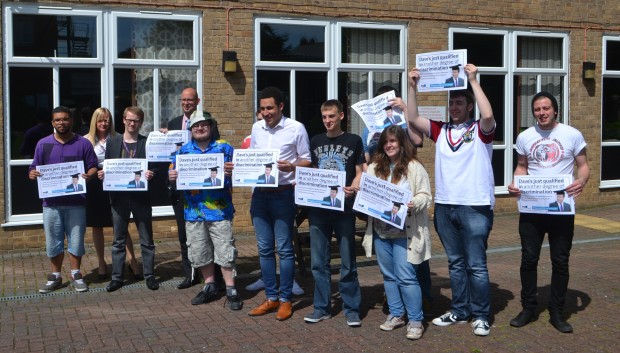Students and representatives from both the University of Lincoln and Bishop Grosseteste University teamed up last Friday to lobby Lincoln MP Karl McCartney against cuts to the Disabled Students’ Allowance (DSA).
The rally, held at Bishop Grosseteste, was part of a national day of lobbying run by the National Union of Students under the #DegreesofDiscrimination hashtag. The union claims it is “deeply concerned at the prospect of these cuts, which could see fewer students receiving the support they need to stay the course”.
However, the official statement announcing the changes, produced by Universities Minister David Willetts, describes them as “measures to modernise the Disabled Students’ Allowances”.
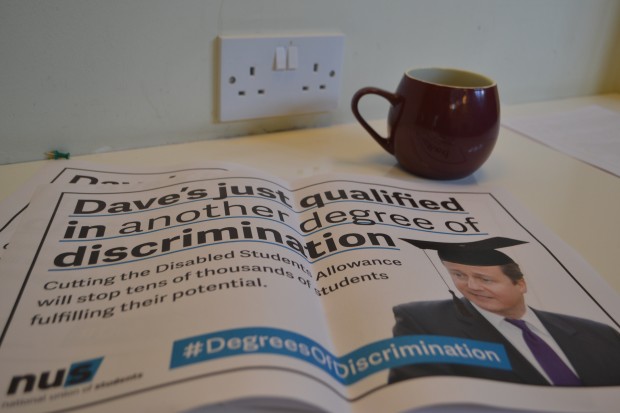
Originally, the campaigners were planning to lobby Karl at his advice surgery at Moorland Community Centre, but they were pleasantly surprised when the MP for Lincoln agreed to meet them for a longer session in the Bishop Grosseteste Student Union building.
After a short session on organising community campaigns, run by outgoing NUS VP Society & Citizenship Dom Anderson, the campaigners welcomed Karl onto a discussion panel, which he shared with Dom and Phil Davis, the Chair of the National Association of Student Money Advisers (NASMA).
Dom kicked off the debate by explaining the impact any cuts to DSA would have on students. “The Conservatives’ and the government’s narrative around higher education reform has been creating a marketplace in education, and whether I agree with that or not, it’s there and it exists,” he said.
“What this will do is remove the choice for lots of people within that marketplace, so there is a serious risk that students will end up having to decide on the institution they go to along the lines of whether they can get the adequate support or not from that institution,” he added.
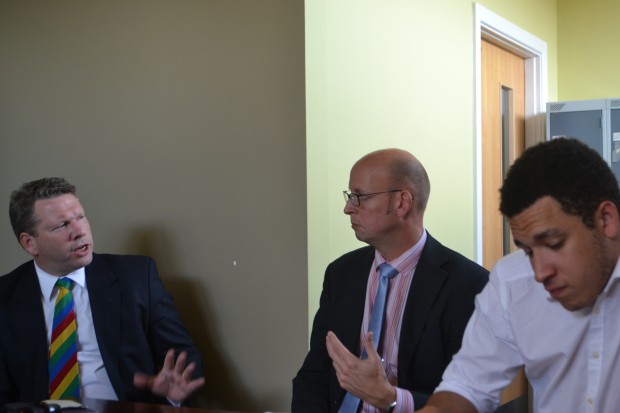
Phil Davis, who is Bishop Grosseteste’s Head of Student Advice as well as Chair of NASMA, used his wealth of experience working within the higher education sector to put an institutional slant on the cuts.
“Back in 2009/10, the Student Loans Company centralised its operations and, in effect, had more oversight of the DSA for the first time. In doing that, the government identified that year that there was a need to increase the take-up of DSA,” he recalled. “That year, I was involved in a project to promote the DSA, which gained recognition from the then minister, David Lammy.”
That project was deemed a success after recent figures showed a 23% increase in take-up of DSA, not necessarily because of such an increase in the number of disabled students, but because more were aware of the support available to them, Mr Davis explained. “What Mr Willetts has done in his ministerial statement is speak of an unsustainable growth in the longer term, based on the increase in expenditure alone, without taking into account the fact that there’s been an increase in people in receipt of the money.
“When he talks about that unsustainable growth in the longer term, what he’s actually talking about is a policy decision which no longer seeks to address the disproportionate number of people with disabilities in higher education,” he continued.
Mr Davis also voiced worries about how quickly the cuts were going to be implemented, and the effect that would have on universities. “In terms of our planning as an institution, our financial planning cycles are well underway for 2015/16, and this cut comes on the back of that. We’ve submitted our access agreements for 2015/16 last month, and those documents do not take into account any of these changes that are being introduced.”
In response to this, Mr McCartney described the increased take-up of DSA as “probably a good thing”, but he warned that “where we are in the wider world is that there is a fixed pot of money”.
“You have to decide what you want to do with that money. I would say the people who really need that money need to access that money, and that’s something this government has said is going to continue,” he affirmed. “But there are legislation changes, such as the Equality Act 2010, where we have to make some changes to this system, which hasn’t changed for 25 years. The EU raises its ugly head again by forcing some of those changes and we have to deal with that.”
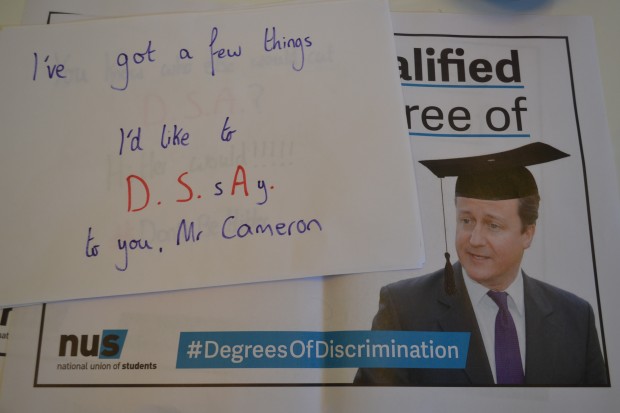
The panel then heard from Abbie, a concerned mother whose 10-year-old son was recently diagnosed with dyslexia. “I had to sit him down, which is quite hard, and tell him: ‘this is why you’ve been struggling, but you know what, it won’t stop you from achieving because institutions have this support. I know because I work at a university and you will get loads of support so you can learn in the same way as people without your disability.’
“I’ve tried to be really inspirational to him, but now I’ve got to sit down and say: ‘well, actually, because I’m a single parent in receipt of working tax credits, but I wouldn’t get extreme hardship funds from an institution because I don’t fall into that bracket, I won’t be able to afford to give him the software and stuff he would need. He’s going to be limited and not have the same options as other people if these cuts go ahead.”
Although she hasn’t voted in the past, because she “doesn’t really resonate with any particular party”, she explained how she would change this habit to support her son. “This is the issue that will make me vote,” she said. “Is he ever going to be able to get a degree? Is he ever going to be able to become an architect, which is what he wants to do?”
In response, Karl affirmed that he and his party “don’t want to close down access to education for anybody from any sector of society”, adding that he sees education as “a great leveller”. He reassured Abbie that he would be “quite happy to take your particular case to the minister and explain your particular concern and ask exactly what the changes are planning to do”.
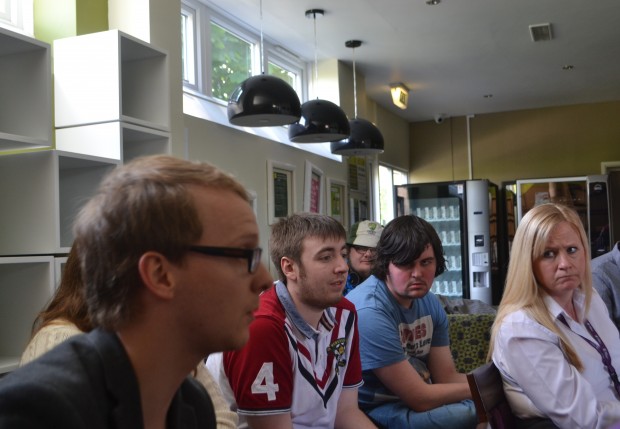
Next to speak was Adam Froud, a student at Bishop Grosseteste University who is in receipt of the Disabled Students’ Allowance because of his dyslexia. He said he was “concerned” that he wouldn’t be able to get the support he needs without DSA.
“The equipment I was given as part of my DSA came to around £3,000 – and since my parents aren’t in a tax bracket, my parents wouldn’t be eligible for hardship funds. If it weren’t for DSA, my parents would definitely have to cut back on themselves,” he worried.
Adam also expressed concerns about how cuts to DSA would affect anyone else wishing to study at the university. “If it is a fixed amount that the universities are providing – if I were to get that £3,000, would it affect my fellow students? Would they have to make a sacrifice so we can play on a level field?”
Mr McCartney said that this boiled down to political philosophy debate about localism. “It’s where the decisions are made – of all the people who access the funding, whatever’s available, who’s better to make the decisions? Is it regulation done by people like me, or is it actually better at the single university entity level, where they can make the right decision about who receives what amount? I would say that’s where it should be at.
“Sure, you can say that this part of the budget should be ringfenced and go up with inflation, but if you do that, there are impacts elsewhere.”
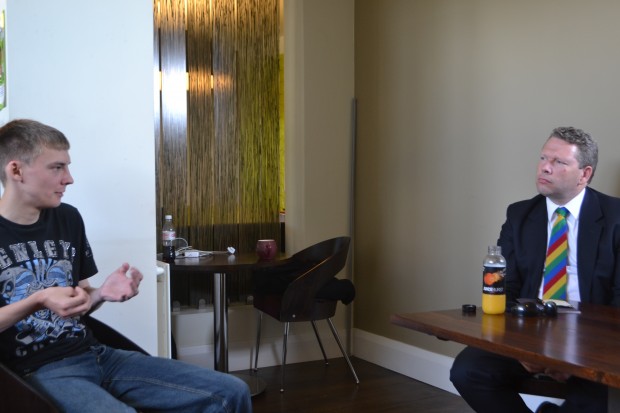
Phil debated the idea that this localism was a good thing for universities or their students. “Effectively, what Karl is describing there is a process of opportunity cost: if you don’t support the DSA through central government sources and it gets devolved to us at a university level, then we’ve got to decide what we’re not going to pay for any more because we’re going to have to bear the cost of what is now being funded by the DSA – not all, but some. There are definitely financial implications in this for higher education institutions.
“Equally, we could talk about those people in the financial sector – those who are really crying out for financial assistance in the world today!” the Chair of NASMA laughed. “Time and time again, what we’re seeing under the coalition since 2010 are cuts which impact on the most vulnerable sections, in this example, of the student community.
“We’ve seen the ‘ringfenced’ budget that was the Access to Learning Fund removed; we’re seeing these changed being brought in on the DSA side of things; and yet your government more than anything has placed the weight of debt on students’ own shoulders.”
“Life, unfortunately, isn’t a meritocracy, nor is it a level playing field,” Karl told the room. “But I wish it was, and that’s utopia. You might think it’s odd for a Conservative to say that, but that’s what I passionately believe in.”
Ultimately, though, everyone wanted to know whether the MP for Lincoln would support their cause and what he would do to show that. Dom pressed him to write and speak to Universities Minister David Willetts, as well as sign Early Day Motion 48, a parliamentary statement by former Education Secretary David Blunkett which “calls on the Government to provide equal access, wherever the student is studying”. The motion has been also signed by Green MP Caroline Lucas and Conservative Sir Peter Bottomley, and was signed by even more parliamentarians following the NUS’ national lobbying.
“I’ll be writing to the [Universities] Minister and the Department, and some of his colleagues as well, because it’ll also impact on people like Esther McVey and Iain Duncan Smith,” Karl promised. “One of the good things about our traditional system – and I am a fan of tradition – is that in the lobbies, we get to see ministers without civil servants being in the way. So, I will be telling him that I had a meeting here with you, I’ll also be telling him what it was about, and some of the points that some of you have told me.”
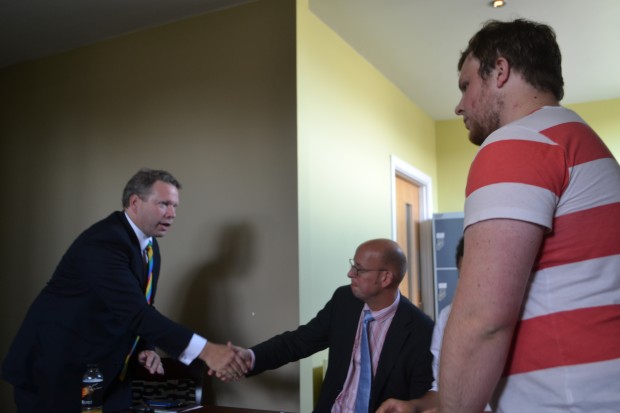
As for the Early Day Motion, Karl couldn’t make such a promise. “I haven’t read it, but I will do,” he said. “I’m a big fan of Early Day Motions, as they show the amount of support around a certain issue. I’m very happy to take a look at that and let you know the reasons for signing or not signing it, because sometimes there is one bit of a phrase that you just can’t put your name to.”
Despite that hanging in the balance, the campaigners seemed pleased with and enthused by their day’s work, having not expected such a warm response to their complaints from a Conservative MP. There were certainly a lot of smiling faces:
